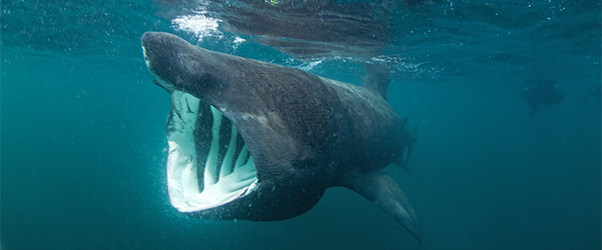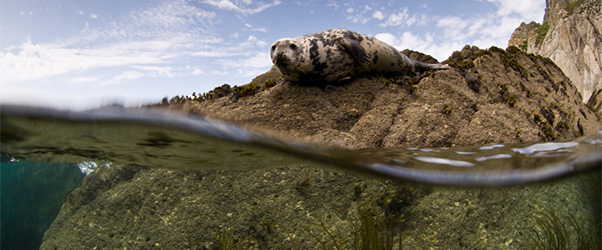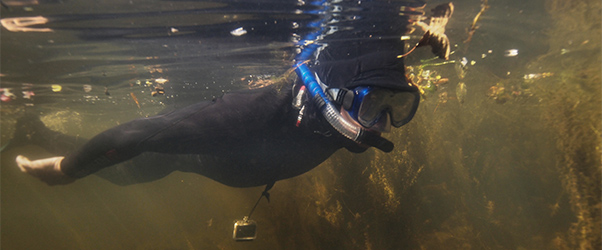Andy Torbet recalls some of his favourite encounters with UK wildlife, especially
of the marine variety.
Britain has lost most of its large terrestrial fauna due to hunting and human pressure. We used to have bears, lynx and wolves in Britain (wolves were still reported in Scotland into the 18th century).
We still retain some exciting creatures such as the peregrine falcon, a common sight now even in our cities. This bird is the fastest animal in the world clocking up speeds of up to 242mph – I should know, I recently attempted to go as fast as one while skydiving from 15,000 feet for my Beyond Bionic TV series on CBBC. And we still have big animals in the form of things such as the iconic red deer and wild boar, after an accidental rewilding in the Forest of Dean. But we are an island nation with a maritime climate.
Nowhere in the country are you more than about 70 miles from the sea so we are all, whether we think in these terms or not, coastal dwellers. And it is the sea that offers the most diverse, spectacular and downright gigantic wildlife spectacles in the UK.
Below are some of my personal recommendations from a lifetime of living, working, playing and filming around and in our seas.
Basking shark These oceanic giants visit our western shores every summer. From May through to September they migrate up the west coast of Britain from Cornwall, past Wales and the Isle of Man all the way to the northwest corner of Scotland. You don’t need complicated diving skills or equipment to interact with these gentle beasts (who possess no teeth and feed only on microscopic plankton). A simple mask and snorkel is all that’s required as they come to the surface to feed for long periods of time. The hot spot in the UK is Scotland’s Gunna Sound and basking shark spotting trips go there from places like Oban.

Grey seal If you want to get up close and personal with some really big wildlife then grey seals might just be for you. Like the basking shark the best ways to interact with these playful creatures is with a mask and snorkel. The seals of the Farne Islands off the Northumberland coast are renowned for their relaxed nature around humans and I’ve had them swimming under my arms and through my legs and even bumping noses with me. There are boat trips which cater for snorkellers from the village of Seahouses.

And if you’re not keen on getting wet they can be seen basking on beaches all around the UK. A particularly good place, although very remote, are the small uninhabited Monach Islands off North Uist in the Outer Hebrides. Every autumn these small sandy isles become the second biggest grey seal colony in the world as the animals come ashore to breed and give birth.
Whales Whale-watching is big business in places such as Vancouver and Norway but we get most of the big names here too. Fin whales, Right whales, humpback whales and even orca are regularly seen each year around north Scotland, Orkney and Shetland. I’ve even had a pilot whale pop up feet away from my sea kayak while paddling off the island of Mull.
Reefs We shouldn’t discount the small things in nature. Snorkelling over a reef can bring you within inches of fish and more, a far closer encounter than you’ll ever get on land with something like bird-watching. The places to try this are endless and I can personally recommend Devon, Cornwall, Dorset, St Abbs, Pembrokeshire and Anglesey.

Sea kayaking Like rambling on the sea (at least that’s how I view it). As you gently cruise over the water you’ll see the coastline from a completely different angle, reach secluded bays inaccessible from land and get closer to the coastal wildlife than you would on foot or in a boat. Taking a sea kayak out on a calm day in the right locations is a perfectly achievable aim with only a day’s training to get the hang of the basics.
We really do have a treasure trove of incredible wildlife to see and appreciate in this country, and getting out there to get close to it has never been easier.
If you fancy checking out some of the marine wildlife mentioned by Andy, head to the Club website where you'll find helpful information on